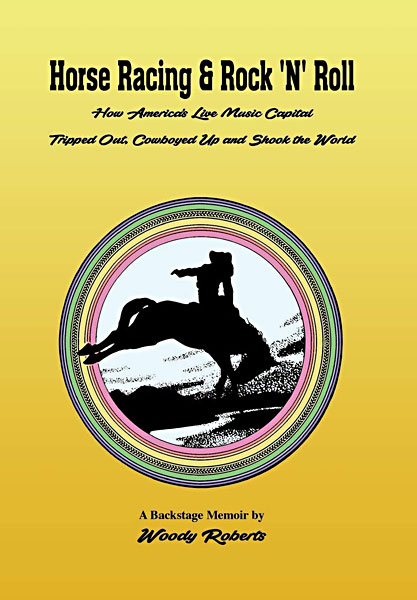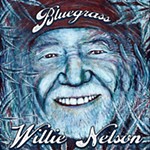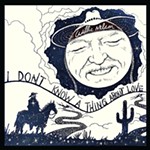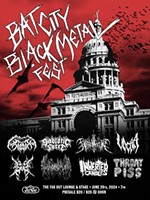Leon Russell & the Bob Dylan Rumor
Outlaw era deejay Woody Roberts helped produce Willie Nelson's first Fourth of July picnic in this excerpt from his new memoir Horse Racing & Rock 'N' Roll
By Woody Roberts, Fri., Dec. 25, 2020
Following our excerpt of Me and Sister Bobbie, outlaw era radio deejay Woody Roberts returns to the scene of the time with a chapter from new memoir Horse Racing & Rock ‘N’ Roll, in which he helps produce Willie Nelson's first Fourth of July picnic, 1973 …
By the time I arrived at Tower Drive in the quiet Tarrytown neighborhood of Austin, several cars were parked on both sides of the street. I rang the front doorbell and Eddie Wilson's wife, Genie, opened it with a welcoming smile.
I walked into a living room where every chair was filled and several men were sitting on the floor. Eddie, who was standing, waved his arms, gave out a hearty greeting, and called out, "Everyone... this is Woody Roberts from San Antonio, and I've asked him to come up here and tell us what to do."
Willie Nelson rose from his chair and shook my hand. Glancing around, I recognized Hank Alrich from his bluegrass picking days in San Antonio. He now operated the recording studio inside the Armadillo and had financed the beer garden.
Beside him were the facility manager, Bob Hedderman, and the resident 'Dillo artist, Jim Franklin. CPA Randy McCall with his wife Diane sat on the couch. Legal counsel Mike Tolleson was there. And I recognized Larry Trader and his running buddy from San Antonio, a fellow used car salesman, Billy Cooper.
A joint was passed my way.
"Anybody need a cold beer?" Genie said.
I listened to Eddie going over the plans. He called on 'Dillo department heads to give their overview: sound, fencing, porta-cans, lighting, the cost of a roof, security and finally... ticket sales.
The room got quiet.
Larry said, "Well, it's still a little early, but we're not really selling any outside of Austin. And, ah..."
"How many in Austin?" Willie said.
"A few hundred."
"Dallas?"
"Less than a hundred."
"What about Houston and San Antonio?"
Larry had a slackened look. "I'm afraid they ain't sellin' yet, Will."
Eddie handed me the Jim Franklin poster. It was great: fireworks burst along the top of a banner-sized American flag stretched across a two-lane highway, and sneaking underneath was a lone armadillo nonchalantly carrying the Texas flag in its mouth. A perfect Fourth of July poster.
I looked at the performer list. Except for Doug Sahm, it had the same kind of lineup as the Dripping Springs Reunion the year before without its biggest stars. Another country music event.
I remembered Pat O'Day of Concerts West saying: "A show with many small acts doesn't add up to a big show. It's still just a show with many small acts."
I looked at Willie. "How was the Reunion's turnout?"
"A few thousand each day, didn't make expenses."
"Hmm."
Just last month, promoter Rod Kennedy had presented Willie Nelson, Michael Murphey, Jerry Jeff Walker – known for writing the Top 10 hit "Mr. Bojangles" – plus 18 other fine musicians, such as Peter Yarrow and Townes Van Zandt – in the Kerrville Auditorium. That concert's turnout was good enough, but its audience was not even close to festival size. And just like Willie's upcoming Fourth of July Picnic, that Kerrville show was on an extended holiday weekend, Memorial Day.
Not a good sign.
"How are you guys promoting this event?"
Larry Trader spoke up. "Joe Jamail is doing Houston. Geno McCoslin has Dallas covered. Armadillo is doing Austin. We've been running commercials on every country station. Getting good extra promotion with ticket giveaways. I'm handling San Antonio tickets and working the album."
"What album?"
"Hold on, just released." Larry strode out to his car and returned with a copy of Shotgun Willie.
"Atlantic label," I said. "I know guys at Atlantic. Doug's latest is on Atlantic. Bob Dylan plays on it."
"[Jerry] Wexler's started a country division," Tolleson said.
I looked at the Picnic's lineup again. Nada. No big draw on this show. No one who could pack an arena. Still, a Fourth of July festival might...
"What do you think, Wood?" Eddie looked at me. He watched me staring deep in thought at the names on Franklin's poster. He said, "Not listed on the poster, but Willie added Leon Russell."
"Leon Russell!" My eyebrows shot up. "You've got Leon Russell?"
"We can't advertise him," Willie said in a firm tone. "Leon's going to sing a song or two and help me emcee. He's trying to reach country music fans."
At this good news, I sucked in my breath. Leon Russell meant all the difference in the world! Now we had a show with a major draw.
Stardom comes fast in the hit music business. In the fall of 1971, the Allman Brothers and Leon Russell were not yet superstars and, with two other bands, had played an outdoor Austin concert at UT's baseball park, Clark Field. Now there wasn't a facility in town big enough for those acts.
There was no doubt in my mind that Leon would legitimize Willie Nelson's Picnic for the rock audience. Kris Kristofferson and Rita Coolidge were semi-known artists getting a tad of national FM airplay, but they weren't rock stars like Leon Russell. I could build a word-of-mouth promotion around that name.
"Well, guys, this is a fine music event. How many tickets do you need to sell?"
Randy spoke up first. "If we sold 10,000, I think we'd pay our bills. Twenty's a home run."
"Problem is," I said, "Counting today, it's only 12 days away. I'd say promote the rock festival aspect and go for walk-up sales. You need a radio ad blast on Top 40 and rock FM."
"But those stations don't play Willie," Larry said.
"I can get rock stations to promote the Picnic," I said. "It's a festival. They'll come."
"There's not enough money for extra stations," Randy said.
I shook my head. "Hate to tell you guys, but this is not a major country music event. The hardcore country audience isn't about to drive from Dallas or Houston for this show."
People mumbled to each other. Willie had a slight frown. Eddie stood up, in his coveralls, looking somewhat like Jerry Garcia ready to play banjo with bluegrass group Old and in the Way. He waved a joint to quiet the meeting. "I recommend we turn this problem over to Woody Roberts."
Willie stared hard at me. "What do you say, Woody?"
"If I do it, I'm going to pull the ad money from Dallas and Houston and spend it in San Antonio and Austin."
Larry was concerned. "What about my Dallas and Houston radio stations?"
"Double their giveaway tickets. Promise VIP passes and interviews. But cut the ads."
He nodded.
"I'll need a temporary office and wall space to put up a promo timeline. Plus an assistant."
"There's a vacant room next to my office," Tolleson said.
Diane raised a hand. "I volunteer. Just tell me what to do."
With a cigarette smoldering between his fingers, Randy McCall chimed in. "Armadillo can't afford to lose on this. We need to make money."
When the meeting was over and folks headed into the night, everyone seemed enthusiastic. Larry Trader pulled me aside and spoke low. "I hope you won't pull the Waco ads."
"Waco?"
"Will's hometown is Abbott. He'd like the folks to hear about his Picnic. The station gets into Abbott."
"Done. And I'll run some ads in Hillsboro where he used to deejay. I think it was on KHBR 1560-AM. Is Shotgun Willie getting airplay?"
"Not much." Larry tugged his beard. "Some folks don't like the cover photo."
"They liked the short-haired Willie."
"Yup, they want the man they grew up listenin' to."
Billy Cooper called out, "Come on, Larry."
Willie was ready to leave. We shook hands again. "Calling it a picnic is a great idea, Willie. The Fourth of July weekend is perfect."
"Thank you, Woody."
"Your poster should say: 'First Annual.'"
Willie laughed. "I hope it is."
The man was worried, his big event was in the hands of a half-dozen latent hippies. His investment was on the line.
Back inside... a gift, two sparkling lines [of cocaine] left on a mirror and two fat joints nearby. Genie said goodnight, leaving Eddie and me to talk into the wee hours. Shotgun Willie was on the turntable. It sounded great, his best studio capture since the Monument session.
Later, Eddie turned on KOKE 95.5-FM so we could hear the world's only progressive country radio station. The KOKE call letters had replaced KAZZ in 1967 when new owners upped the station's power to 3,000 watts. Now manager Ken Moyers and programmer Rusty Bell were using 95.5 to once again introduce a new format to listeners. The all-night deejay was sick and music director Joe Gracey was filling in. His set was a mix of Dan Hicks & the Hot Licks, a Leo Kottke instrumental, Lightnin' Hopkins, Maybelle Carter, Tom Waits, Steve Fromholz, and the Rolling Stones.
Eddie lit an unfiltered Camel as we popped open the last two cans of Lone Star. "What are you thinking of doing with the Picnic ads?"
"We'll cut 'em crossover so they can play on three formats. I'm going to build the show around San Antonio and Austin rock FM and Top 40 listeners. For radio mentions, we'll give away a ton of Leon Russell albums, each with a pair of Picnic tickets. Deejays will be able to say Leon is flying in to be with Willie. Makes the rumor that Dylan might show up for Doug's set more believable."
"There's a Dylan rumor?"
"Why not? Could happen. He plays on Doug's new Atlantic album, same label as Willie. Gives our Picnic a rock star mystique for word-of-mouth, and gets some FM play for Doug. Folks are ready for Central Texas to have a rock festival. With Leon there, it won't matter if no other rock musicians show up. In fact, it won't even matter as to whose picnic it is, just where and when. It could be Jerry Jeff's Picnic, or Michael Murphey's."
Eddie laughed. "Actually, Jerry Jeff Walker outdraws Willie."
"Willie draws best in small Texas towns."
I took my time flipping through Eddie's collection of 12-inch albums. Tasty assortment, heavy on folk. I noticed the lack of English rock bands, no Pink Floyd or Zeppelin, but here was Loudon Wainright, Jimmie Rodgers, Flatt & Scruggs, Mance Lipscomb, John Prine, Freddie King, Joan Baez, Delbert & Glen, Grateful Dead, Leon Redbone and...
"Wow, you have Willie's Panther Hall album."
Eddie nodded and turned off the radio. With slow and cautious hands, he removed the 12-inch platter from its paper sleeve, placed the hi-fi tone arm's needle in the opening groove, and reached for our last joint.
Today some consider Waylon Jennings' Honky Tonk Heroes to be the first "outlaw" album. Not so. A month earlier Atlantic had released Shotgun Willie recorded in NYC and Memphis and produced by Jerry Wexler, a man acclaimed for his R&B hits.
I'd say that was the beginning of the outlaw country albums.
Eddie and I were at the Armadillo World headquarters office by 10am. Diane McCall had beat us there and brought a box of croissants and a wide roll of butcher paper. Diane was a mix of voluptuous brunette and earth mother.
"Where do we start?" she said.
"Let's put up the wall planner and break it down into 12 days."
"Eleven days," Diane said.
The room was empty but for a rectangular wooden table and chair. A long window overlooked traffic on Barton Springs Road. I pulled in a second chair. We tacked up an eight-foot-long strip of butcher paper and marked out 11 days.
"Okay, Diane, these are the elements. Quick as possible, we start commercials on every FM rock station in Austin and San Antonio. Five days out start the more expensive AM Top 40's. Larry's already bought the country stations. We need to mail press releases and special deliver Willie interview tapes all over Texas, from Port Arthur to El Paso. We need to secure live Willie phone interviews with big stations, especially all-night deejay Bill Mack at 50,000-watt WBAP 820-AM in Fort Worth. We'll set up contests using tickets and albums for prizes."
Diane took notes, then looked up. "What else?"
"I'll see to recording the ads and then set up Willie interviews. What you could do is get station ad rates, along with the program, music, and news directors' names. The names of national music magazine reviewers will be handy if you come across them. We'll need three dozen manila envelopes."
Diane took more notes. Very professional.
"I'm heading back to San Antonio this afternoon. I'll write the spots and set up production time at KEXL."
She looked up again. "Anything else?"
"No... Oh yeah, first time we talk to someone at a radio station, let's say, 'To the best of our knowledge, there's no truth to the rumor Bob Dylan will be there. That he'll be hanging out with Doug Sahm.'"
"There's a Bob Dylan rumor?"
Copyright 2020. Woody Roberts, through Treaty Oak Publishers, Austin, TX. All rights reserved.










